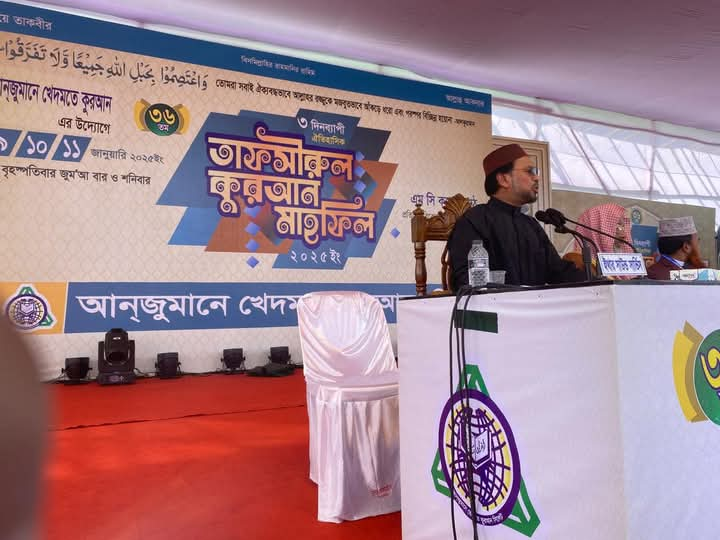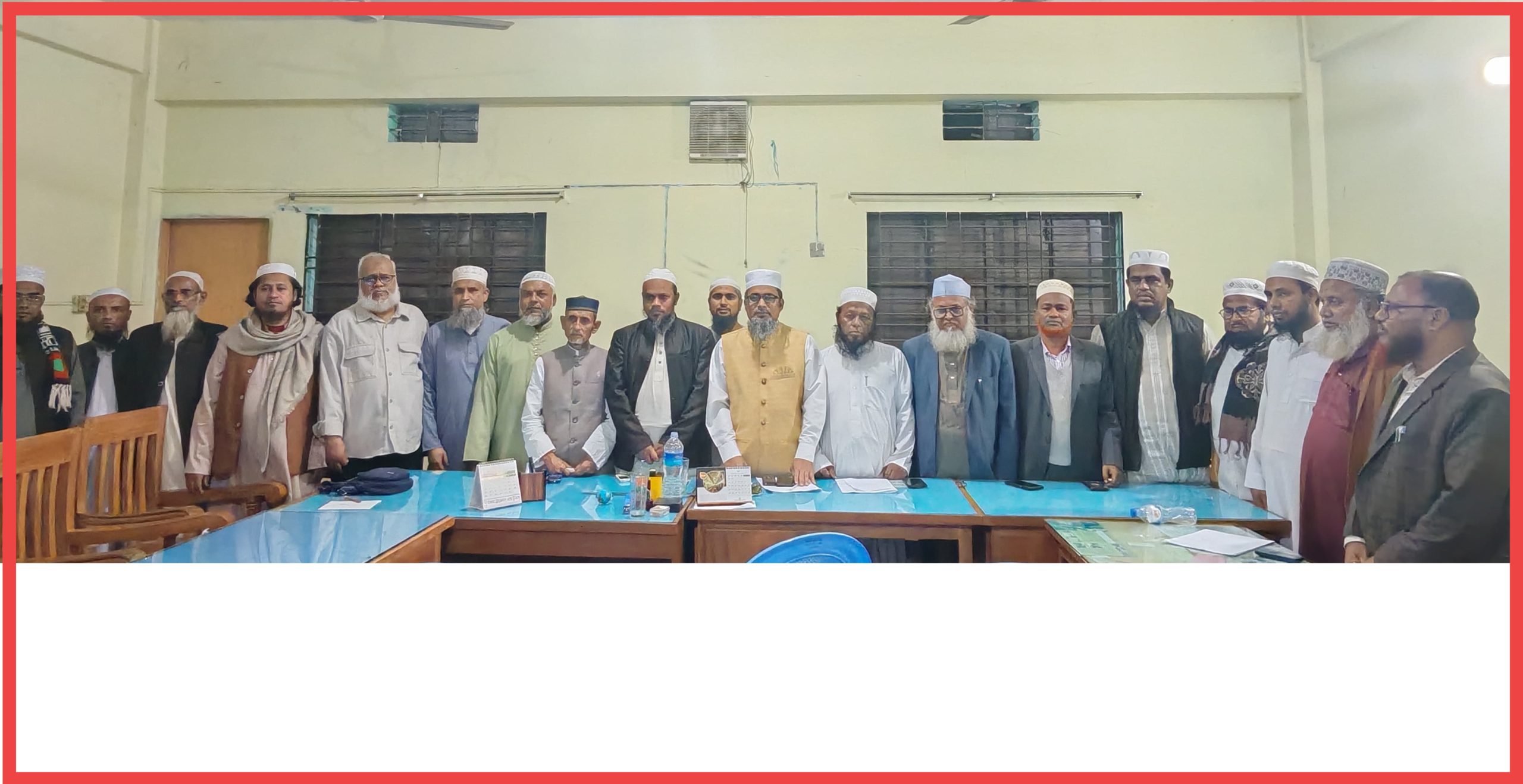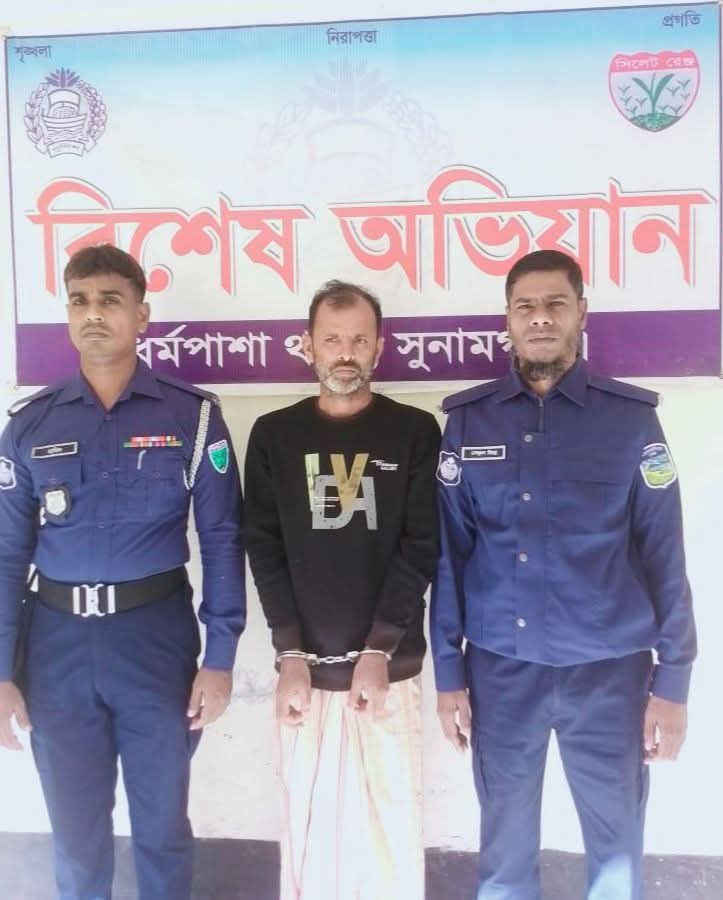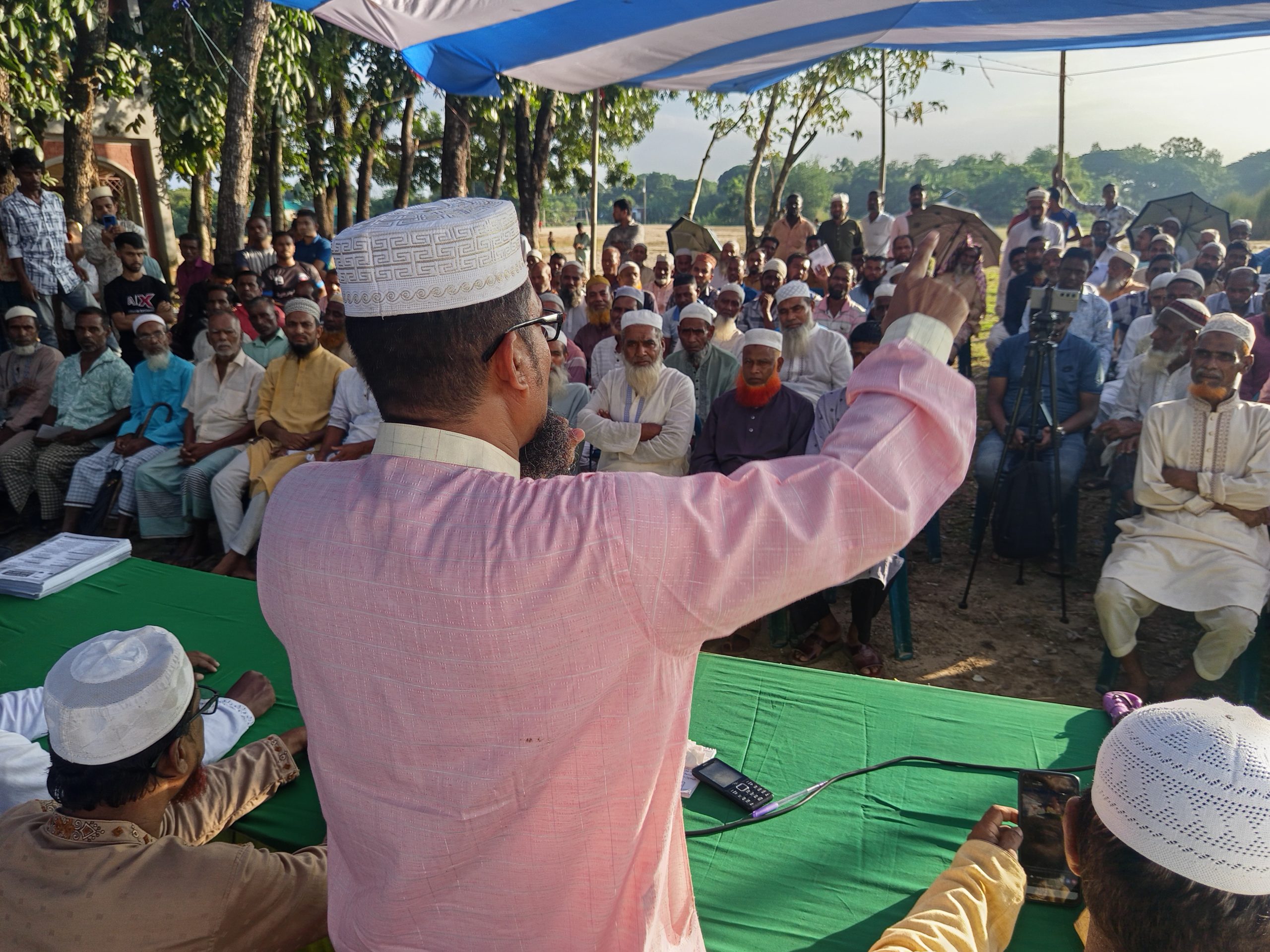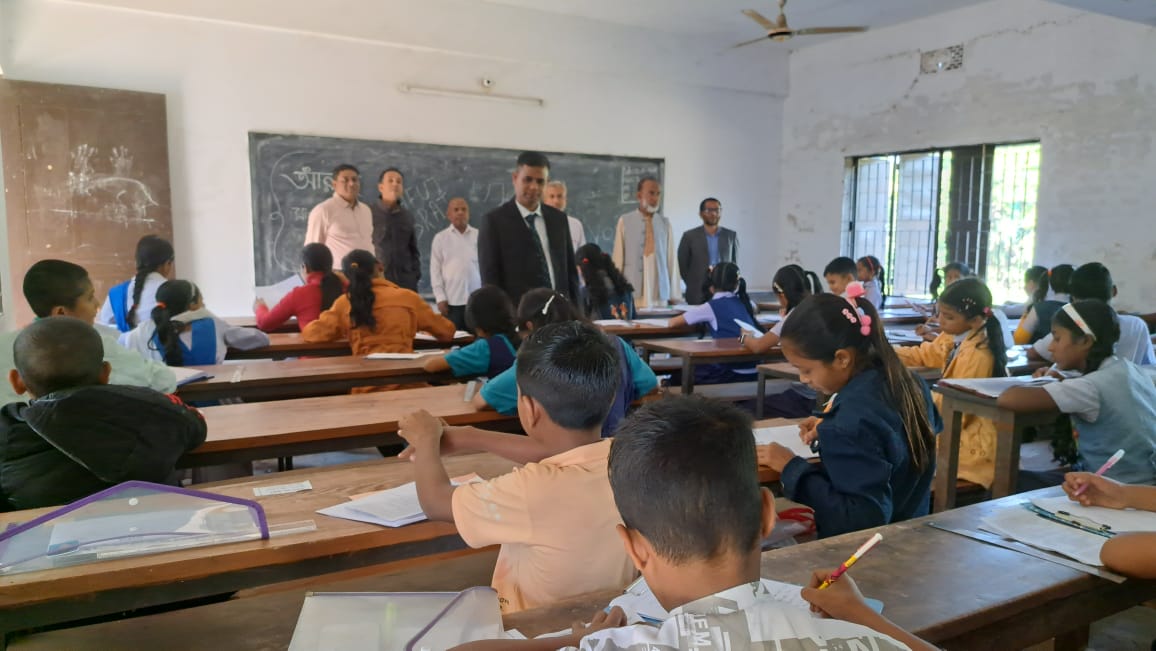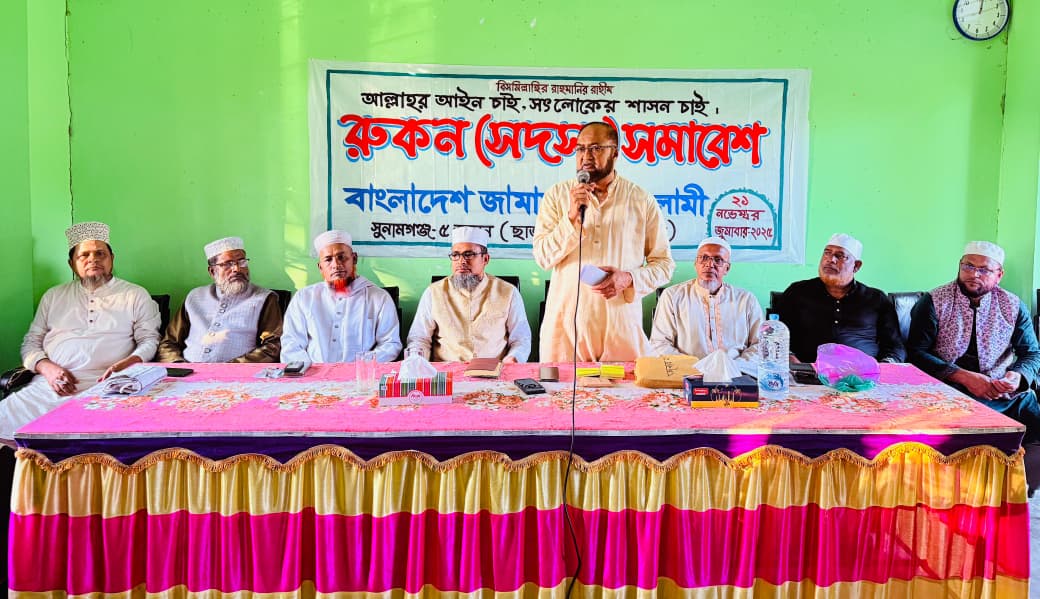What happened in Sylhet on the day of Dr Azhari’s programme?

- আপডেট সময় : ০৪:১৩:৩২ অপরাহ্ন, রবিবার, ১৯ জানুয়ারী ২০২৫
- / 313
What happened in Sylhet on the day of Dr Azhari’s programme?
In Sylhet’s history no programme has attracted so many people as the recent 3 days of Tafsirul Qur’an event had, some 300,000 people from all over Sylhet arrived on the last day of the event, which was oozing a festive atmosphere with participants in a celebratory mood. There were young and old alike, all here to listen to their favourite speakers. There were two headline acts that brought most people here: Amir Hamza and Mizanur Rahman Azhari. They are the foremost top two prominent and popular speakers in Bangladesh today.
I was invited to speak at the event. This was my first ever public speaking invitation to such a large gathering in Bangladesh. I was in two minds about whether to speak in Bangla or English. I have never spoken in Bangla in such a public gathering of such size or magnitude. To be honest I was nervous about speaking in Bangla. I was requested to speak in English by the organisers but I found that in direct conflict with my principle – I have always advocated speaking in the language of the people and since I could speak the language there was no excuse. I decided to speak in Bangla. It was good to get my Bangla public speaking tested. I was nervous but I think I did well.
I stayed for the rest of the day to listen to the remaining speakers. In the evening it was turn for Amir Hamza to speak and he was welcomed on to the stage with a rapturous welcome. I carefully listened to his lecture while sitting on the stage right at the front. I disagreed with a few things he said especially his attempt on offering explanations to the disjointed letters (haroof al-muqatta’at) in the beginning of certain chapters of the Qur’an. He attempted to explain the disjointed letters that appear in front of the 36th chapter of the Qur’an “Ya Seen”, when no definite explanation has been offered by the Prophet (peace be upon him) or his companions. Speakers should refrain from giving isolated explanations to mass audiences whose capacity to understand would be limited.
I also took exception to his interpretation to the verse of the Qur’an that reads “men are responsible over women”. This verse generally outlines a particular responsibility on men over women – God has given responsibility to men to be responsible for and take care of women in society instead of exploiting, objectifying or abusing them. physically a man is stronger than a woman, he should use his God given physical strength to protect women.
Women are copartners in life and mutual protectors in this world as stated in the Qur’an “believing men and women are protectors of one another”. The Qur’an is emphatic on the role or status of men and women as complementary and not competitive, sent by God with equal worth and dignity, with a clear purpose of worshiping God alone and mutually supporting each other in struggling to create a society based on justice, fairness, equality and compassion.
He quoted the verse 4:34 ٱلرِّجَالُ قَوَّٰمُونَ عَلَى ٱلنِّسَآءِ بِمَا فَضَّلَ ٱللَّهُ بَعْضَهُمْ عَلَىٰ بَعْضٍۢ وَبِمَآ أَنفَقُوا۟ مِنْ أَمْوَٰلِهِمْ ۚ which means “Men are the caretakers of women, as men have been provisioned by Allah over women and tasked with supporting them financially.”
The above verse of the Quran was quoted partially by him and he offered partial explanation to it too. The verse clearly indicates men’s responsibility to take care of women primarily based on the general reality, where men are physically stronger and more likely to be breadwinners. Thus the lion share of responsibility for taking care of women lies on men. This does not preclude women from playing vital role in society including taking up leadership roles. His opinion that the above verse of the Qur’an states a blanket prohibition on women from becoming leaders is incorrect and inconsistent with the teachings of the Qur’an as a whole.
He quoted a hadith that says “no nation will prosper if they appoint a female as their leader” was also unfairly interpreted to suit his position. His interpretation has a number of problems. Firstly, this hadith is narrated by one single person thus cannot be used as evidence for making absolute rules. Secondly, it was a prediction of what would happen to a specific nation; the blessed prophet made a statement around a particular historical event in Persia where an incompetent person was appointed as their ruler, that person happened to be a woman and the blessed Prophet made a prediction that this nation, i.e. the Persian people of that time would be ruined because they had appointed this particular ruler who was totally unsuited for such a mammoth task; to be the ruler over a world superpower of that time was not a small matter. As a matter of fact, she was their last ruler before Persian empire was defeated and Muslims became victorious. So the blessed Prophet’s prediction was true. Thirdly, there is no Quranic verses that prohibits a woman from being chosen as their political leader. Contrary is true because God praises the Queen of Sheeba, “Bilqis” for her courage, wisdom and eventual submission to God and acceptance of Prophet Sulaiman’s prophethood. She led her nation to success and prosperity, Quran recognises that. Fourthly, the idea that men are superior over women and therefore more entitled to being leaders is totally antithetical to the Islamic traditions. Superiority and inferiority is not determined by one’s biological status, rather it is by one’s God consciousness and character that one attains the true height of piety and honour. God consciousness is not a tangible trait nor is it a matter of judgment for humans. It is an inner state of being manifested through the quality of relationships one has with God and through interpersonal relationships with our self, fellow humans and the environment. God only knows who is truly God conscious. It is therefore wholly inappropriate to suggest that human beings, male or female, should be constrained in attaining their God given potential because of their natural biological realities. Since God and His messenger have not prohibited women from attaining positions of leadership why should men play God and restrict women? I found Amir Hamza’s opinion on women problematic.
Apart from the two issues I have raised above Amir Hamza was good with his words, delivery and engagement with the audience. He was able to keep the audience with him and deliver his message well. He was funny where humour was needed, he was fiery where the audience needed to be riled up and he was stunningly melodious. The audience behaved impeccably with him, there were no audience heckling or disrupting.
I didn’t agree with everything he said but that’s part of our human nature, we are all disagreeable and in a free country freedom of speech was essential. I am critical of Amir Hamza but I will defend his right to speak freely and if he breaks the law by inciting violence or hatred he shall face the consequences.
The field was heaving with people at this stage. There was no other fields in Sylhet that was big enough to be able accommodate nearly half a million people. After careful consideration this particular field was chosen as it was located at the outskirts of the city and would have created the least amount of traffic for the residents and businesses. Even after all that there was no room to even stand. Every inch of the field was full. Every surrounding streets were jam packed with people and traffic. It was like a massive pilgrimage. People were waiting in huge anticipation that their star attraction, Mizanur Rahman Azhari would be next as the events final and most attractive speaker. You could feel the intensity of excitement in the air.
All began well. His arrival was managed smoothly, fortunately he traveled using ordinary passenger plane instead of a helicopter that had become a trademark mode of transport for him in Bangladesh. I particularly detest such pompous arrival as it creates unnecessary drama, rouses suspicion and portrays an image of arrogance and opulence, all of which is unbefitting of an Islamic scholar and preacher. I understand if the location of the event is so remote that his travel would be impossible via any other normal means except a helicopter. However, making helicopter arrival part of the drama is wrong!
More than 300,000 people sat calmly as Mizanur Rahman Azhari eulogised his introduction using his extremely melodious voice. For some odd reason he started with very low voice, almost inaudible even by us who were sitting on both sides of the stage where he sat and spoke. In Bangladeshi tradition these kinds of speaking events were held in the winter up and down the country and called “Wazz” – religious lectures. It comes with extensive amount of story telling through singing, reciting verses from the Qur’an using melodious rhythms, engaging the public by asking them questions and getting them to respond, speaking using fiery and angry rhetoric to rile up the audience, and rousing the audience to the point where they would collectively shout all forms of slogans in support of what the speaker may have suggested. Some people take it to the point of hysteria! It’s all fun and audience love it. There is no doubt that over time and especially now this form of religious lecture events have become a form of halal entertainment. Sadly, it really doesn’t transform peoples thinking or behaviour.
Right at the front and on the left hand side of a massive stage the organisers had allocated a raised platform for the growing sea of YouTubers. They had thousands of applicants but they only allowed 50 to place their cameras on tripods and either live broadcast or record the proceedings. This particular raised bed was an eye sore and obstruction, that sat directly in front of a whole section of the audience. I could sense this was going to create a problem.
What became very clear very quickly was that there were a massive number of young people who were there because Mizanur Rahman Azhari was their celebrity idol. He was like a pop idol but with a massive difference- he was teaching them Islam. His style of peaching was very popular amongst the youth and they came to see him and engage with him. However, not all of them could see him directly. Even though there were LED screens everywhere, these fans were eager to see their idol with their own eyes and nothing was going to stop them.
Young people in the audience and behind the YouTubers were losing patience fast. They couldn’t see the speaker and they couldn’t hear much because of the incessant shouting from the excited crowd. So they decided to push and make their way forward to the front. They were able to create a surge leading to a massive bottleneck and eventually total takeover of the already occupied front space. There were constant push and pull between the newly arrived youth and already sat down and settled audience. Several scuffle broke out with people pushing and shoving each other and in some cases people throwing plastic water bottles at the invading youth. It was a chaotic situation and very disturbing for the speaker.
Mizanur Rahman Azhari was doing his level best to engage with the youth and reassure them that he was there for them and with them. He didn’t want these unruly fans to create any major problem. I fully understand his position and frustration, it must have been extremely difficult for him to concentrate on delivering his message. He was repeatedly addressed them, calming them down and making kind and polite requests for them to sit down and not disrupt. However, these youth were celebrity struck, they were totally besotted by the presence of their hero. They had lost their sense of rationality and were behaving like teenagers in love.
It is true that most of these youth were in their teenage years and they didn’t fully understand their surroundings or behave rationally. It was like how young people behave when they fall in love. These youth were in love with their idol. For the organisers to expect them to behave any different would be a wasted of time and for the adults attempting to disciple them was totally counter productive.
When Mizanur Rahman Azhari was trying to manage the unruly fans he was addressing them directly. They were teenagers and in Bangladesh older people would address the younger ones using specific address suitable for the age group. So when he was saying “tumora” (তুমরা) he was addressing the younger crowd who was creating the problem, he didn’t need to use “Apnara” (আপনারা) for the older crowd because they were behaving extremely well. Yet post the event, many opportunistic critics have jumped on the bandwagon to malign and discredit the speaker accusing Mizanur Rahman Azhari for being discourteous to the older crowd. These critics are dishonest, they know what he was doing was correct yet they are clutching onto thin straws to make themselves feel important. Sadly, this is another example of sickening behaviour from these opportunists.
Some of these critics were upset because Mizanur Rahman Azhari said he will remember how badly Sylhet treated him. He is right, some of these youth of sylhet were unruly, disruptive and foolish. Instead of attacking the guest who was at the receiving end of bad behaviour, parents of these youth from Sylhet should apologise to Mizanur Rahman Azhari. Instead of shedding fake tears of upset and hurt, they should be shedding tears of remorse and regret, tears of humility and respect to the speaker. In my view he did nothing wrong but keep a very difficult audience together for nearly one and half hours. For this people of Sylhet should thank him and show gratitude.
After the event I spoke to many youth and what I quickly discovered was that they were actually listening to his YouTube videos constantly and were familiar with his message. The fact that they had replaced pop idols with this religious scholar, who looked young, spoke extremely well and in the language of the youth and most importantly he carried them with his charisma and melodious voice. These are good things in my view. The youth had taken him as their role model. The organisers should learn from this and tailor their future programmes accordingly.
Here are my suggestions for the future:
1. Hold youth only event with Mizanur Rahman Azhari in a style and venue that is suitable for the youth.
2. Hold separate event for the older generations with Amir Hamza and other speakers that the older generations like.
3. Do not place a sea of YouTubers at the front blocking audience views. Give them a single feed from a central broadcast platform.
4. Do not promote or encourage celebrity worship, the focus should always be on the message and the person delivering the message.
5. Big events are wonderful but they come with bigger challenges. Maximising the impact should be the focus and not showmanship!
It was a great pleasure and honour to be part of the audience at such an event and witness the incredible transformation taking place in Bangladesh. I pray for its continued success and prosperity.


